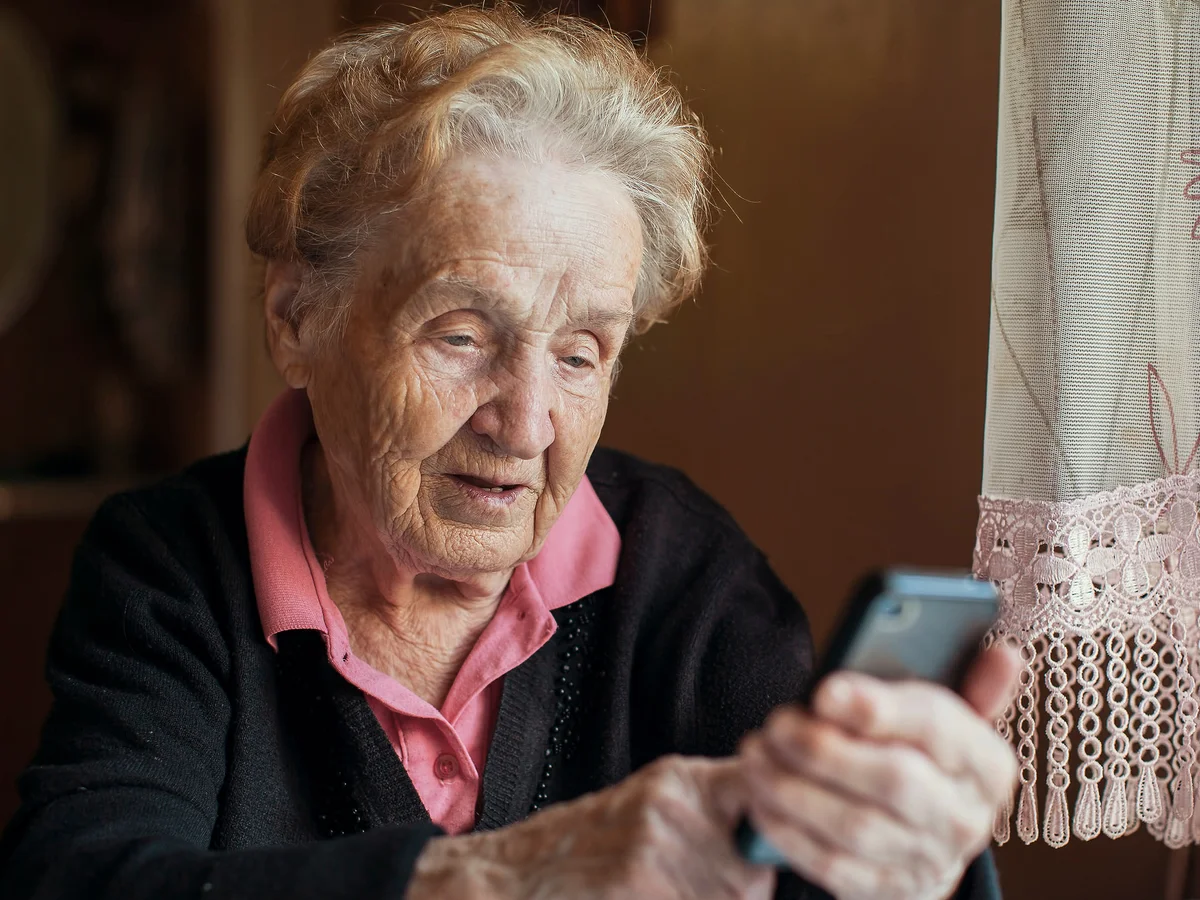
We spend a lot of time wringing our hands about the younger generation, don’t we? “Kids these days, always glued to their screens!” we exclaim, shaking our heads with a sigh. But what if I told you we’ve been looking in the wrong direction all along? What if the real digital screen addicts are a demographic we often overlook, one that might surprise you, and frankly, needs our attention more than ever?
It’s true. According to recent insights, it’s time to meet the real screen addicts: the elderly [1]. Yes, you heard that right. While we’ve been busy monitoring our teenagers’ scrolling habits, our seniors have been quietly developing a serious, and growing, relationship with their smartphones, one that can significantly impact their mental and physical health [6]. Over 80% of individuals aged 60 and above are smartphone users, which is fantastic for connection, but for many, it’s tilting into excessive use, leading to some concerning outcomes [7].
The Digital Embrace: What’s Driving Our Elders Online?
So, what’s really going on here? Why are more of our beloved elders becoming so engrossed in their devices? It’s not just about learning how to FaceTime with the grandkids or finally mastering that solitaire app. There’s a deeper, more nuanced story at play, and it often revolves around a sense of connection, or rather, the lack thereof. Think about it: smartphones offer a window to the world, a constant stream of information and perceived interaction. For someone feeling a bit isolated, that can be incredibly compelling.
Research points to several fascinating, albeit concerning, drivers. One study, surveying 371 subjects in China, found that subjective cognitive decline and family relationship conflict significantly affect older adults’ smartphone addiction [2]. It appears these factors often work through a shared intermediary: a sense of alienation [2]. Imagine feeling a little less sharp than you used to be, or perhaps experiencing a bit of friction with family members. A smartphone can offer a quick, albeit temporary, escape or a sense of engagement that might be lacking elsewhere. It’s like finding a cozy corner in a bustling room; it feels good for a while, but it doesn’t solve the underlying issue of why you felt the need to retreat in the first place.
Another crucial aspect highlighted is self-control deficits [2]. We often think of self-control as something children need to learn, but it’s a lifelong skill that can waver. For older adults, particularly when combined with feelings of alienation or cognitive shifts, the ability to put down the phone can become genuinely challenging. It’s not always a conscious choice; sometimes, the digital world just pulls you in, like a strong current, before you even realize you’re far from shore.
The Surprising Twist: Good News and Bad News
Now, here’s where things get a little interesting, and perhaps, a bit counter-intuitive. While we’ve been talking about the risks of smartphone addiction, one study revealed a surprising upside. This particular research aimed to observe the effect of smartphone addiction on reaction time in the elderly population. And the results? The elderly who were smartphone addicted actually had better (meaning less) reaction time compared to those who were not addicted or used smartphones moderately [4]. Yes, you read that correctly! It’s like finding out that eating a specific brand of potato chips secretly makes you better at chess. Who knew all that scrolling and tapping could potentially sharpen a specific cognitive skill? The study used the Mobile Phone Addiction Scale (MPAS) and the Ruler Drop Method (RDM) to arrive at this finding [4].
But let’s not get carried away, folks. While a quicker reaction time is certainly neat, it’s just one piece of a much larger, more complex puzzle. The overall picture painted by other research suggests that excessive smartphone use among seniors brings a myriad of risks related to mental health, social dynamics, and cognitive functions [7]. Ultimately, while these devices can be valuable tools for connection and support, over-reliance significantly diminishes mental health, social engagement, and other cognitive skills among older adults [7]. It’s a classic double-edged sword: a super helpful tool that can cause harm if not handled carefully.
Beyond the Screen: Holistic Health Impacts
So, what are these broader impacts we’re talking about? We’re not just discussing eye strain here. Excessive smartphone usage can profoundly affect seniors’ mental and physical health [6].
For starters, heavy reliance on social media platforms, for example, can ironically lead to increased feelings of isolation and depression, even though these platforms are designed to connect people [7]. It’s like being in a crowded room but feeling utterly alone. The constant comparison, the curated lives, the sheer volume of information—it can all be overwhelming and detrimental to one’s emotional well-being. Individuals struggling with this often face emotional struggles related to excessive smartphone use, addressing feelings of loneliness, anxiety, or depression that may stem from their addiction [7].
Beyond mental health, there are tangible physical ramifications. One study aimed to shed light on the relationship between smartphone addiction and physical activity, activities of daily living (ADL), and balance levels in elderly individuals [5]. Think about it: if you’re constantly looking down at a screen, you’re likely less engaged in physical activity. Less movement can lead to a decline in physical fitness, which in turn can impact everyday tasks, those important ADLs that allow for independent living. And balance? Well, staring at a screen while walking, or even just sitting hunched over for extended periods, isn’t exactly a recipe for maintaining good balance. This potential decline could impact everything from navigating their home safely to maintaining independence [5]. Health professionals are looking at this because effective interventions could greatly support daily activities and overall well-being [5]. They use tools like the Smartphone Addiction Scale-Short Version (SAS-SV) to assess addiction, the Physical Activity Scale for the Elderly (PASE) for physical activity, the Lawton Instrumental Activities of Daily Living Scale (Lawton IADL) for ADL, and the Fullerton Advanced Balance Scale (FAB-T) and Timed Up and Go Test (TUG) for balance evaluation [5].
Recognizing the Signs and Charting a Healthier Path
So, how do we spot if our beloved elders are falling into this digital trap? The symptoms of smartphone addiction in seniors are similar to those in younger populations but might be less obvious. Keep an eye out for increased time spent on the phone, neglecting other activities, feeling anxious or irritable when the phone isn’t accessible, and physical signs like poor posture or reduced mobility [6]. If Grandma seems more interested in her device than your family dinner, it might be a sign.
The good news is that this isn’t an insurmountable problem. Seniors can absolutely manage their smartphone usage to prevent addiction. It starts with establishing clear guidelines for daily phone habits [6]. Perhaps it’s designated screen-free times during meals or before bed. Maybe it’s setting a timer for social media use. Little fences make good neighbors, and clear boundaries make for healthier habits.
But it’s not just on the individual. We, as families and communities, play a crucial role. By creating a culture of awareness and engagement, we can help seniors navigate the challenges associated with smartphone addiction [6]. That means fostering real-world connections, encouraging hobbies, and simply spending quality time together. It also means addressing the underlying emotional struggles, like loneliness, anxiety, or depression, that might be fueling excessive screen time [7]. Sometimes, what looks like a phone problem is actually a need for connection, a listening ear, or an engaging activity.
So, the next time you see an elder deeply engrossed in their smartphone, instead of a quick judgment, consider offering an alternative. A shared story, a walk in the park, a board game – sometimes the best app is an actual human connection. Let’s make sure our seniors are using technology to enhance their lives, not replace it.
Sources & Footnotes
- https://www.economist.com/international/2025/10/23/meet-the-real-screen-addicts-the-elderly ↩
- https://pmc.ncbi.nlm.nih.gov/articles/PMC10360404/ ↩
- https://www.reddit.com/r/research/comments/1o1uknq/why_is_there_barely_any_research_on_phonescreen/ ↩
- https://www.medsciencegroup.us/articles/JNPPR-6-162.php ↩
- https://bmcpublichealth.biomedcentral.com/articles/10.1186/s12889-025-22145-0 ↩
- https://www.rosewood-nursing.com/post/seniors-addicted-to-phone ↩
- https://www.willowshealthcare.com/blog/seniors-addicted-to-phone ↩

Leave a Reply